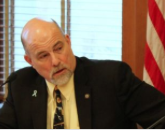By MEGAN HART

The House and Senate have sent Gov. Sam Brownback a bill that would remake juvenile justice by reducing punishments for less serious offenses.
Senate Bill 367 would set limits on youth incarceration and probation, direct state officials to come up with a consistent system of consequences for technical parole violations and reduce the use of juvenile detention, among other changes.
Supporters charged that the state was locking up too many low-level young offenders without evidence that doing so improved their outcomes. Some of the bill’s provisions came from recommendations by a workgroup of legislators and staff in the juvenile justice system, as well as researchers from the Pew Charitable Trust.
Senator Greg Smith, an Overland Park Republican, said the House extended some time limits, clarified that programs for young offenders should be evidence-based and added a “lockbox” provision to ensure that savings from reduced incarceration rates would go toward community-based programs.
“Some of them are good amendments that I think made the bill even stronger,” he said. The bill “provides a shining example for the rest of the United States of what we can do in juvenile justice.”
The House passed the version of the bill that emerged from conference committee on a 118-5 vote. The Senate passed it unanimously, 40-0.
If Brownback signs the bill as written, the courts have a short timeline to comply. All members of a 19-member committee to oversee juvenile justice reform would have to be appointed by Sept. 1 and meet within two months, and the Kansas Supreme Court and Department of Corrections would need to develop a system of graduated responses to technical parole violations by Jan. 1.
The bill passed with the following changes:
- The Department of Corrections could only contract for 50 beds in group homes, and would have to first contract with homes that have low recidivism rates. Department of Corrections spokesman Adam Pfannenstiel said he believes that number will be “more than adequate.”
- Case length limits wouldn’t apply to youths convicted of the most serious offenses, and courts would have the option to extend jurisdiction until a young offender’s 23rd birthday. Youths who violate the conditions of their juvenile sentences still could be sentenced as adults under extended jurisdiction. The original bill ended extended jurisdiction and limited case length for almost all offenses.
- The court can extend probation for “good cause.” The normal probation limit for low- and moderate-risk offenders would be six months, with a nine-month limit for youths at a high risk of reoffending. The court could extend probation by one month for low-risk offenders, three months for moderate-risk ones and six months for high-risk ones.
- Diversion programs will last six months rather than four months.
- The maximum time youths can spend in detention was extended from 30 days in the original bill to 45 days. Currently, there is no limit.
- Probation officers can issue a warrant, rather than a summons, if a youth had technical parole violations and was determined to be likely to place property at risk. The bill originally would have allowed a warrant only if the youth was a danger to others.
- The duties of the committee overseeing juvenile justice reform would include looking into the idea of granting youths speedy trial rights, investigating gaps in the system and seeking alternative placements for youths in group homes.
Megan Hart is a reporter for KHI News Service in Topeka, a partner in the Heartland Health Monitor team. You can reach her on Twitter @meganhartMC
